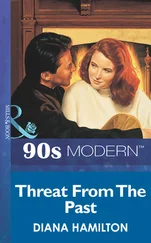The courts decided in favour of the men. The fact that Helga had had a previous sexual relationship with both Dipstick and Rod and the fact that she had gone voluntarily for sex at the hotel told heavily against her. Besides which, in the long run it came down to the word of four people against one.
Helga moved away from Bad Nauheim almost immediately following the court case. She wrote home once or twice and Mitti heard that she was living in Hamburg, but after that she seemed to disappear.
The careers of the four soldiers never recovered. Whatever the courts may have decided, such a sordid incident was too much for the army to ignore and they were marked men. One by one they returned to civilian life in the States, angry and bitter and having learnt nothing from their experience. Quite the opposite, in fact. All four men came to believe absolutely that their treatment had been grossly unfair and that the woman Helga had set out viciously to destroy them for no better reason than feminine pique.
The case shocked and disturbed both the army and the local community. Jack, who was called as a witness to recall the course of events during the early part of the evening, found his emotions and his principles confused and divided. He engaged in a heated correspondence with his brother Harry on the issues raised by the awful affair. Harry felt that it was obvious that the four soldiers were in the wrong and that they had got off far too lightly. Jack could not see things so clearly. He remembered the sight of the young man Brad crying in the witness box, pleading that he had really thought that the sort of girl that Helga was did not care much about one man more or less.
“ And what about you, Jack?” Harry wrote back furiously. “Is that what you think? Does being a soldier make a guy so dumb that he can rape a woman by mistake?”
No, Jack knew that he could never do that, but he wondered. He wondered what he would have been like as a man if he had never met Polly. Would he have been like Brad? Would he too have been capable of getting drunk and seeing a woman not as a whole and complex person, confused and in pain, but just as some kind of two-dimensional sexual animal? It was possible, of course it was possible. All men had a darker side; that was what made them capable of killing. Jack was a soldier and he knew that very well. To Jack what the Bad Nauheim case had shown was what that dark, uncivilized side of man was capable of when it gained the upper hand. It was a lesson he was not to forget.
Jack may have betrayed Polly’s love but Polly’s love had not betrayed him.
Polly finally left the peace camp with the gap that Jack had left in her heart and soul still not filled. She was unsettled and restless. She could not return to her old life, the one she had known years before; it had moved on without her. All her friends from that time were already in their second year at university. She saw them occasionally but she no longer had anything in common with them. She knew that deep down they felt sorry for her.
“But what are you going to do after all this?” they asked. “You can’t just be a protester all your life.”
“Yeah, well, maybe I can,” Polly replied, but she knew that it sounded stupid.
Still looking for something and nothing she became a traveller, a member of one of the New Age convoys that roamed the country at the time. Polly liked living on the move. It gave her the impression that she was going somewhere. She started seeing a casual dope dealer called Ziggy who owned a Volkswagen Camper. Polly was fond of Ziggy. He was thirty-six and painfully handsome with deep, piercing blue eyes. He had a Ph.D. in Ergonomics and was an extremely bright and interesting conversationalist, when he was not stoned. Unfortunately this was only for about fifteen minutes each morning. For the rest of the day Ziggy tended to merely giggle a lot.
It was fun for a while, rejecting hierarchy and property, but it couldn’t last. Slowly but surely Polly began to long for a more structured life, a life where she could watch television without having to stare through the window at Dixons and go to the toilet without taking a spade. She was twenty-one, Mrs Thatcher had just won yet another election, and Polly had not been entirely clean since Duran Duran had been at the top of the charts.
She left Ziggy, which hurt him badly.
“But why, Poll?” he asked. “I thought we had a scene going.”
“It’s the giggling, Ziggy. I just can’t handle the giggling.”
“I’ll giggle less,” he pleaded. “I’ll start smoking hash instead of grass. It’s a much mellower high.”
But it was no use. Polly left the convoy and moved to London, where she virtually became a street person, spending two months standing on the never-ending picket outside the South African Embassy. It was while on the anti-apartheid picket that Polly met an alternative comedian called Dave, whose opening line was “Good evening, ladies and gentlemen. Would you like to see my bollocks?” Dave was nice, but he was, in his own words, “Not into monogamy, right?” In truth, he saw his gigs as no more than a good way of pulling girls. There might have been a time when Polly would have turned a blind eye to such behaviour, but these were the great days of AIDS paranoia so Polly took one last look at Dave’s bollocks and moved on again.
It was around this time that Jack also moved on, leaving his regiment in Germany and returning to the US to take up a post at the Pentagon. He, like Polly (and Bono) hadn’t found what he was looking for either, but, unlike Polly, he had a good idea of what it was and where it might be found. What Jack was looking for was success and, for a soldier without a war to fight, that meant going to Washington. In Washington promotion prospects were, if not good, certainly better than on the Rhine.
It was a frustrating time for an ambitious soldier, although paradoxically the military had never been held higher in the nation’s esteem. Reagan, who had never served in the forces himself, was a soldier’s president. He believed in big defence budgets and plenty of parades. US prestige could not have been greater, the Soviet Union was haemorrhaging in Afghanistan and the corridors of power buzzed with news of the famed Star Wars initiative with which the Pentagon intended to militarize space. Public interest in the army was unprecedented, with gung-ho movies like Rambo and Top Gun filling the cinemas. Things had improved considerably since the dark days of twenty years before when an adolescent Jack had refused to accompany his parents and his brother Harry to see MASH and Catch 22, a terrible, demoralizing time when America had been briefly ashamed of its fighting men.
None the less, for all the celluloid mayhem, real soldiers do actually need real wars in order to be promoted. If the fellow above you does not get shot, then you have to wait twenty years for him to retire and the same goes for the fellow above him. Jack was thirty-six and getting frustrated.
“ I’m middle-fucking-aged and still a captain!” he wrote to Harry. “I was one of the youngest captains ever. You remember that? It was in the local paper and everything.”
Harry did indeed remember it. Their father and mother had been furious with embarrassment.
“Not only does he have to be a soldier,” Jack Senior had lamented over his muesli and fat-free organic yogurt. “He has to be a successful soldier. Why didn’t we just bring up a fascist and be done with it! I just hope that none of my students get to hear about this. Every day I bust my ass trying to civilize young people and now my own son is the youngest damn captain in the army!”
At the time Jack had been delighted at his father’s discomfort, but as the years went by and he felt himself sinking into career doldrums Jack felt less inclined to crow.
Читать дальше












